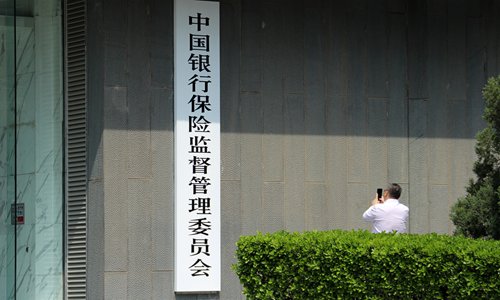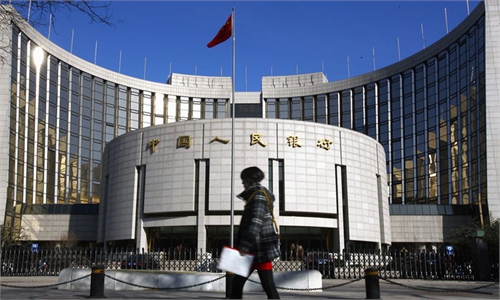Chinese regulator vows unrelenting efforts to resolve financial risks
Push against monopolistic practices to continue

A visitor takes photos of the headquarters of China Banking and Insurance Regulatory Commission (CBIRC) in Beijing File photo: IC
China's banking and insurance regulator on Tuesday vowed unrelenting efforts to monitor and resolve all kinds of financial risks as the 14th Five-Year Plan (2021-25) unfolds this year, making a special mention of woes over the bursting of Western financial assets.
The regulator also reiterated a tough stance on the national push against monopolistic practices, while pledging to advance higher-level financial opening-up.
Describing risk prevention as an eternal subject for the financial sector, Guo Shuqing, chairman of the China Banking and Insurance Regulatory Commission (CBIRC), told a press conference in Beijing on Tuesday that strengthening the rule of law in the financial sphere and improving long-term mechanisms are on this year's priority task list.
Among the top tasks is enabling the nation's financial sector to offer targeted support for key areas including technological self-reliance and self-improvement, advanced manufacturing, privately owned firms, small and micro-sized businesses, rural vitalization and green development.
Guo reflected upon the impact on China's market of its head start over other economies in monetary policy normalization as the Chinese economy has taken the global lead in emerging from the impact of COVID-19.
Europe, the US and other developed economies, the countries that took a battering from the pandemic and some developing countries have all adopted a proactive fiscal policy and an extremely loose monetary policy. It's understandable that such measures are a must to steady the economy, Guo stated, while warning against the repercussions of the moves.
Side effects have gradually emerged, with the European and US financial markets reaching high levels that are utterly counter to the real economy, the CBIRC chairman said, noting that the financial market is supposed to be indicative of the real economy. If there's too large a discrepancy, problems would arise, and sooner or later there would be a forced correction.
"We're fairly concerned about the financial market, particularly [over] whether foreign financial assets would burst someday."
Saying that years of efforts to contain financial risks deserve commendation, market watchers pointed to the fragility of the equity market, which has shown itself to be susceptible to global market volatility.
With many of the most-concerned areas in risk terms having been dealt with in recent years, effectively reining in unregulated activities such as shadow banking and peer-to-peer lending, there's little chance of a systemic financial risk, Tang Jianwei, chief macro analyst at the Financial Research Center of Bank of Communications, told the Global Times on Tuesday.
Financial leverage has seen a conspicuous fall, with the blind expansion of financial capital fundamentally reversed. Between 2017 and 2020, the annual average growth of banking assets stood at 8.3 percent, while the growth of the total assets of the insurance sector was 11.4 percent, roughly half of their annual average growth rates for 2009-16, Guo disclosed at the briefing.
Additionally, the amount of non-performing loans that were resolved from 2017-20 totaled 8.8 trillion yuan ($1.36 trillion), outstripping the combined amount for the previous 12 years.
The size of the shadow banking sector has contracted by about 20 trillion yuan from its historic peak, he added. Also, the trend of the property market becoming monetized and forming a bubble has been contained.
Despite all of this, the domestic stock market is easily prone to global swings, notably in downward moves. The flagship Shanghai Composite Index opened slightly higher on Tuesday after US stocks posted a rally on Monday, but it still lost 1.21 percent to end narrowly above 3,500 points.
Speaking of A shares' fragility, Tang said that the market is not only influenced by economic fundamentals and domestic policies but is often "at the mercy of other markets" and could in some cases be oversold.
The US market has been on a bull run for 11-12 years and its current capitalization, as measured by price-to-earnings ratios, is by no means cheap, but it's not at its peak as of yet, the economist commented.
Federal Reserve chief Jerome Powell recently said that the US central bank is committed to its current policy, citing inflation and employment remaining well below the Fed's goals.
The toughening of fintech regulation was also one of Tuesday's highlights.
If financial services are conducted online via internet platforms, be they banks, micro-credit firms or consumer finance companies, these platforms must have adequate capital, like other financial institutions, Guo stressed.
Internet platforms providing the same financial services will have to comply with the same capital adequacy ratio as their traditional financial counterparts, the CBIRC chief said, revealing a transitory period of a maximum of two years for these platforms to comply.
In a research report sent to the Global Times, Moody's said that the holistic approach is set to give regulators more flexibility in accommodating rapidly evolving fintech innovations as new regulations put a focus on business substance over form.
"The emerging fintech policy framework will reduce systemic risk from under-regulated fintech growth, but create adjustment risks as industry participants react to new regulations, leading to a period of moderating fintech growth and investment in the sector.
"Nonetheless, strong policy incentives to encourage future fintech innovations that support economic development and financial inclusion will remain," the rating agency wrote.


